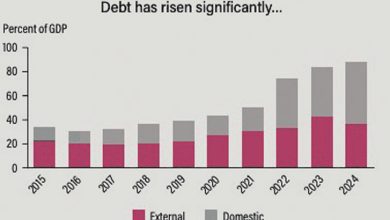Five years on, debt fund yet to roll out
Five years after announcing plans to launch a Debt Retirement Fund, Ministry of Finance and Economic Planning has remained mum on the progress of the initiative.
The fund, announced by former minister of Finance Felix Mlusu in the Tonse Alliance administration’s maiden national budget on September 11 2020, was meant to be a special vehicle to mobilise resources for servicing debt using new sources, including proposed levies on alcohol and cigarettes.

The fund was initiated after a rise in the total public debt stock, which as at June 2021 stood at K5.5 trillion or 59 percent of the rebased gross domestic product (GDP), representing almost three times the size of the 2021/22 National Budget, which was pegged at K1.9 trillion.
Over the years, public debt stock has jumped to K16.19 trillion or 86.4 percent projected GDP as at September 2024, half the size of the 2025/26 National Budget projected at K8 trillion.
Some progress was registered to have the fund operationalised as the legislation to facilitate the establishment of the fund was embedded into the Public Finance Management Act through an amendment which Parliament passed in the 2021/22 financial year.
Secretary to the Treasury Betcheni Tchereni was yet to respond to our query on the progress of the fund by press time at 10am yesterday.
However, a Treasury source speaking on anonymity said apart from limited financial resources, what remain to operationalise the fund are regulations, which would also see technicians to run the fund brought on board.
“I think it is a brilliant idea that is failing to see the light of the day.
“It was too ambitious coming up with the Debt Fund without looking at the fiscal realities of Malawi.”
Speaking in a separate interview on Tuesday, former minister of Finance in the Democratic Progressive Party administration Joseph Mwanamvekha observed that in the current scenario, it is impossible to run a Debt Retirement Fund.
He said: “Almost all the revenues are not being remitted because government doesn’t have fiscal space. Where will the money to run this fund come from?”
On her part, Malawi Economic Justice Network executive director Bertha Phiri lamented slow progress towards the implementation of debt strategies, urging authorities to speed up the process.
Budget and Finance Committee of Parliament chairperson Gladys Ganda, in an earlier interview, faulted the delay to roll out the fund amid concerns that it could derail the country’s capacity to restructure and manage public debt.
Ministry of Finance and Economic Affairs Principal Secretary for economic affairs Ted Sitimawina is on record as having said the ministry was still exploring ways to finance the fund, adding that the lack of revenue weakened the country’s capacity to capitalise the fund.
“We are exploring areas on taxation, but we need to be specific on what sectors of the economy we are going to tax and how much we are going to tax,” he said.
During the launch of the 14th edition of the Malawi Economic Monitor, the World Bank warned the Malawi Government to tread carefully on the establishment of the fund, saying proposed financing options could exert additional fiscal pressure, worsen the country’s public debt woes and burden consumers already under pressure from a myriad of levies and taxes.





